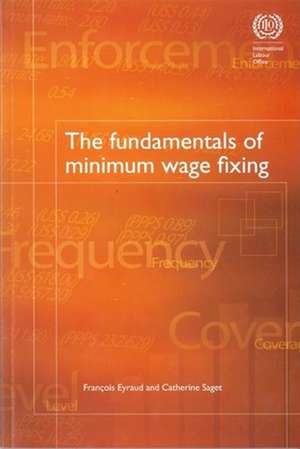The Fundamentals of Minimum Wage Fixing
Autor Francois Eyraud, Catherine Sageten Limba Engleză Paperback – 23 mar 2006
The minimum wage is an economic and social policy tool that is both powerful and flexible. Drawing on a comprehensive database of the principal legal provisions and minimum-wage fixing mechanisms in 100 countries, this book sheds light on its intricacies by providing a thorough overview of the institutions and practices worldwide. It outlines the main topics for debate concerning the effects of minimum wages on major social and economic variables such as employment, wage inequality, and poverty. The book considers the various procedures countries use for implementation, including the criteria employed to fix the minimum wage, and how they are linked to specific country objectives. It then measures its efficiency, and focuses on the impact of the minimum wage on employment as a major political issue. This new volume also looks at the relationship between the minimum wage and poverty, and considers two rarely studied issues: which wage earners are excluded from the scope of the main legislative texts, and what causes non-application of the legislation?
Preț: 114.07 lei
Nou
Puncte Express: 171
Preț estimativ în valută:
21.83€ • 22.79$ • 18.06£
21.83€ • 22.79$ • 18.06£
Comandă specială
Livrare economică 14-28 martie
Doresc să fiu notificat când acest titlu va fi disponibil:
Se trimite...
Preluare comenzi: 021 569.72.76
Specificații
ISBN-13: 9789221170143
ISBN-10: 9221170144
Pagini: 140
Dimensiuni: 152 x 229 x 6 mm
Greutate: 0.26 kg
Editura: Brookings Institution Press
Colecția International Labor Office
ISBN-10: 9221170144
Pagini: 140
Dimensiuni: 152 x 229 x 6 mm
Greutate: 0.26 kg
Editura: Brookings Institution Press
Colecția International Labor Office
Notă biografică
François Eyraud is the executive director of the ILO Turin Training Center. Catherine Saget is a researcher in the Conditions of Work and Employment Programme at ILO.
Descriere
The minimum wage is an economic and social policy tool that is both powerful and flexible. Drawing on a comprehensive database of the principal legal provisions and minimum-wage fixing mechanisms in 100 countries, this book sheds light on its intricacies by providing a thorough overview of the institutions and practices worldwide. It outlines the main topics for debate concerning the effects of minimum wages on major social and economic variables such as employment, wage inequality, and poverty. The book considers the various procedures countries use for implementation, including the criteria employed to fix the minimum wage, and how they are linked to specific country objectives. It then measures its efficiency, and focuses on the impact of the minimum wage on employment as a major political issue. This new volume also looks at the relationship between the minimum wage and poverty, and considers two rarely studied issues: which wage earners are excluded from the scope of the main legislative texts, and what causes non-application of the legislation?
